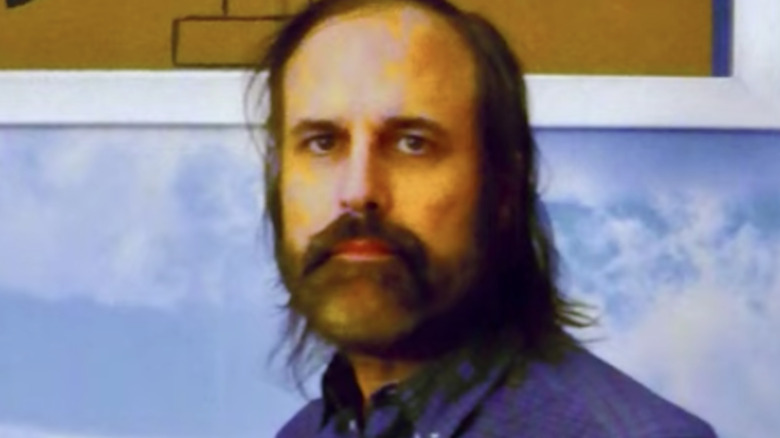The Tragedy Of David Berman
The New York-based indie rock band Silver Jews was formed in 1989 by its founder and frontman, David Berman. The three-member band also consisted of drummer Bob Nastanovich and guitarist Stephen Malkumus. The group was mostly known for making catchy and quotable songs like "Random Rules" and "Trains Across the Sea," says The New York Times. Most of the songs were written by Berman and were often experimental, mellow tracks about life. The group created music for most of the '90s and into the 2000s.
But by the early '00s, the band's music somewhat shifted as the lyrics of their songs approached darker and more serious subjects. In 2003, Berman would have a life-changing year. He had already been suffering from depression, and to cope, he used drugs and dealt with drug addiction, reported The Guardian. It was a battle that he fought throughout his career, and one he would unfortunately lose in the end.
David Berman's childhood and creating his band
David Berman was born in Williamsburg, Virginia on January 4, 1967. His parents were Mimi and Richard Berman, the former a social worker, and the latter a lawyer and lobbyist, a career that would put the father and son at odds in later years. When David was young his parents divorced and his mother moved to Ohio. Berman would relocate as well, to live with his father in Texas. He told Little Village Magazine that his parents split and the time he spent with them in two contrasting cities greatly affected his life. "Little Wooster, Ohio and gargantuan Dallas, Texas formed the municipal cocktail of my life up till age 18. That drab, weird little town and the glitzy big one shaped me for sure," he said.
But he returned to his home state for college and attended the University of Virginia. It was during his college years that Berman first met and befriended his future bandmates Nastanovich and Malkumus. After completing their studies they all moved east in the late '80s, and started playing music. Silver Jews was founded in New York City, and in 1994, the trio released the group's debut album, "Starlite Walker."
Berman's mental health struggles lead to a suicide attempt
Berman spent most of life battling mental illness, while still creating and performing his music. But in 2003, not long after the release of the band's fourth album, Berman found himself hitting a low point.
He attempted suicide that year with an overdose. Berman had ingested a dangerous combination of drugs and alcohol, but he survived and eventually had to enter rehab to recover. By the next year, Berman was clean, making music again, and began speaking out about his mental illness struggles, according to Rolling Stone. Unfortunately, he continued trying to cope with his depression.
In 2005, the band had put out their seventh album, "Tanglewood Numbers," which they toured for once Berman was out of rehab. And in 2008 the Silver Jews released their last album as a band, titled "Lookout Mountain, Lookout Sea." It was the group's final project, because the following year, Berman made the choice to disband it.
Like father, unlike son
Breaking up his band was a major decision for Berman, but this group break-up wasn't like the others. Many assumed it would have been because of his health issues, but Berman cited reasons that were beyond his drug use and depression: It was because of his lobbyist father and the pair's distanced relationship (via The Guardian). Berman once wrote that he was taking a break from music and dedicating himself in a crusade to challenge his father's "despicable" beliefs.
"Previously I thought that through songs and poems and drawings I could find and build a refuge away from his world. But there is the matter of Justice. And I'll tell you it's not just a metaphor. The desire for it actually burns. It hurts. There needs to be something more. I'll see what that might be," wrote Berman on what was then the band's messageboard.
Berman vowed to end his father's far right politics and somehow reverse the harm he was responsible for, by giving him an ultimatum. "A couple of years ago I demanded he stop his work. Close down his company or I would sever our relationship. He refused. He has just gotten worse. More evil. More powerful. We've been 'estranged' for over three years," he wrote. (According to The Guardian, his father's career as a lobbyist included work against animal rights, trade unions, and in opposition to anti-drunk driving efforts. The news program "60 Minutes" referred to Berman's father as "Dr. Evil.")
David Berman returns to music after long hiatus
It's unsure how far he got through to his father. But Berman returned to music solo after a decade, with his project titled "Purple Mountains," in 2019. Purple Mountains was also the name under which he was releasing his new music, and the name of his blog that he used to share his thoughts and poetry. His loyal fans were elated with the comeback.
But things were a lot different. He didn't reunite with his old bandmates for his new project. David and his wife Cassie had split up a year earlier, and he was grieving the loss of his mother, who died in 2016. Berman also left the East Coast for the south, living in Nashville, Tennessee. The sorrows from his marriage ending and losing a parent were heavily noted on his album.
Berman got rave reviews and said that it was his mother's death that inspired him to make music again, per Pitchfork. It would be his only project after returning to music.
Berman's crippling depression costs him his life
The comeback may have seemed to indicate that Berman had taken a much-needed break from the music industry, but things would only get worse for him. He was still suffering from depression. On August 7, 2019, just a month after his resurgence and album release, Berman died at 52 years old. He was found in his Brooklyn apartment; his cause of death was ruled as suicide by hanging (via The New York Times).
While his often daunting musical lyrics gave insight into his mind, his death was still a shock to many. Even though he had issues with his father, it was a devastating loss for the older Berman. "Despite his difficulties, he always remained my special son. I will miss him more than he was able to realize," said Richard Berman (via Billboard).
If you or anyone you know is having suicidal thoughts, please call the National Suicide Prevention Lifeline at 1-800-273-TALK (8255).





